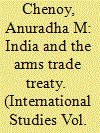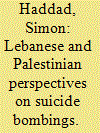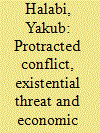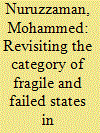|
|
|
Sort Order |
|
|
|
Items / Page
|
|
|
|
|
|
|
| Srl | Item |
| 1 |
ID:
101268


|
|
|
|
|
| Publication |
2010.
|
| Summary/Abstract |
The Arms Trade Treaty (ATT) seeks to regulate the transfer of conventional arms on the principle that arms exporters and importers have a responsibility to ensure that weapons are not used in violations of international law. India wants the ATT to be limited to illicit trade. It believes that the United Nations has various mechanisms to deal with human rights violations and that this issue should not be linked to arms trade. Indian citizens have spoken against gun vio-lence. Whether it is against the guns that killed Jessica Lall in Delhi or people in the conflict zones of Manipur, Kashmir or the Maoist-affected regions, Indians are fighting against the menace of the gun culture. The ATT is a just cause and India needs to support it.
|
|
|
|
|
|
|
|
|
|
|
|
|
|
|
|
| 2 |
ID:
101267


|
|
|
|
|
| Publication |
2010.
|
| Summary/Abstract |
While suicide terrorism has received tremendous attention from the general public, media and policy-makers in recent years, there are only a few studies that analyze public opinion on political violence in general and terrorism in particular. The article seeks to determine the correlates of support for suicide terrorism among the Lebanese and Palestinians living in South Lebanon and the Palestinian territories. Specifically, it examines the influence of religious and socio-economic factors on their attitudes towards suicide bombings. The analysis is based on four surveys conducted in Lebanon and the Palestinian territories in 2002, 2003 and 2007. The findings show that generally, militant religious view is the most important predictor of the respondents' support for suicide terrorism.
|
|
|
|
|
|
|
|
|
|
|
|
|
|
|
|
| 3 |
ID:
101269


|
|
|
|
|
| Publication |
2010.
|
| Summary/Abstract |
This article argues that a protracted conflict, in general, has strengthened the state vis-à-vis the society in Egypt, Israel, South Korea, Syria and Taiwan. Yet, the existentially threatened states, namely, Israel, South Korea and Taiwan, have pursued economic development and industrialization as a strategic objective. While all three states have been strategically important for the hegemon, the United States, the latter has encouraged them to adopt an export-oriented strategy and opened its own market to their exports. Given the rise in state strength, an existentially threatened state becomes more capable of extracting taxes and mobilizing the society for industrialization. Both Egypt and Syria, in contrast, were merely engaged in a protracted conflict. Consequently, they were not under pressure to maximize their power through industrialization and/or export-led growth strategy, and each explored, in its own unique way, short-cut solutions for regaining its occupied territory.
|
|
|
|
|
|
|
|
|
|
|
|
|
|
|
|
| 4 |
ID:
101266


|
|
|
|
|
| Publication |
2010.
|
| Summary/Abstract |
International Relations scholars and policy-makers are increasingly paying greater attention to a new category of fragile and failed states across Asia, Africa, the Balkans, the Caucasus, Latin America and the Middle East. While effective policy responses are necessary to strengthen these politically fractured, economically collapsing and socially divided states, the category itself appears to be more politically and ideologically charged and less critically understood in the context of international relations. There is a general tendency to avoid examining how political and economic policies and military actions by the West contributed to the degeneration of these states. This article seeks to re-examine the causes of state fragility and failure, and critically reviews the current US strategies to rebuild the failed states of Afghanistan and Iraq. It argues that the US-led statebuilding strategies in both countries are based on a wrong diagnosis of the political and social problems, and the solutions offered are also ill-conceived. The article also contends that the Western liberal vision of the state, premised on the Weberian notion, commands less relevance to the fragile and failed states in the non-Western world.
|
|
|
|
|
|
|
|
|
|
|
|
|
|
|
|
|
|
|
|
|